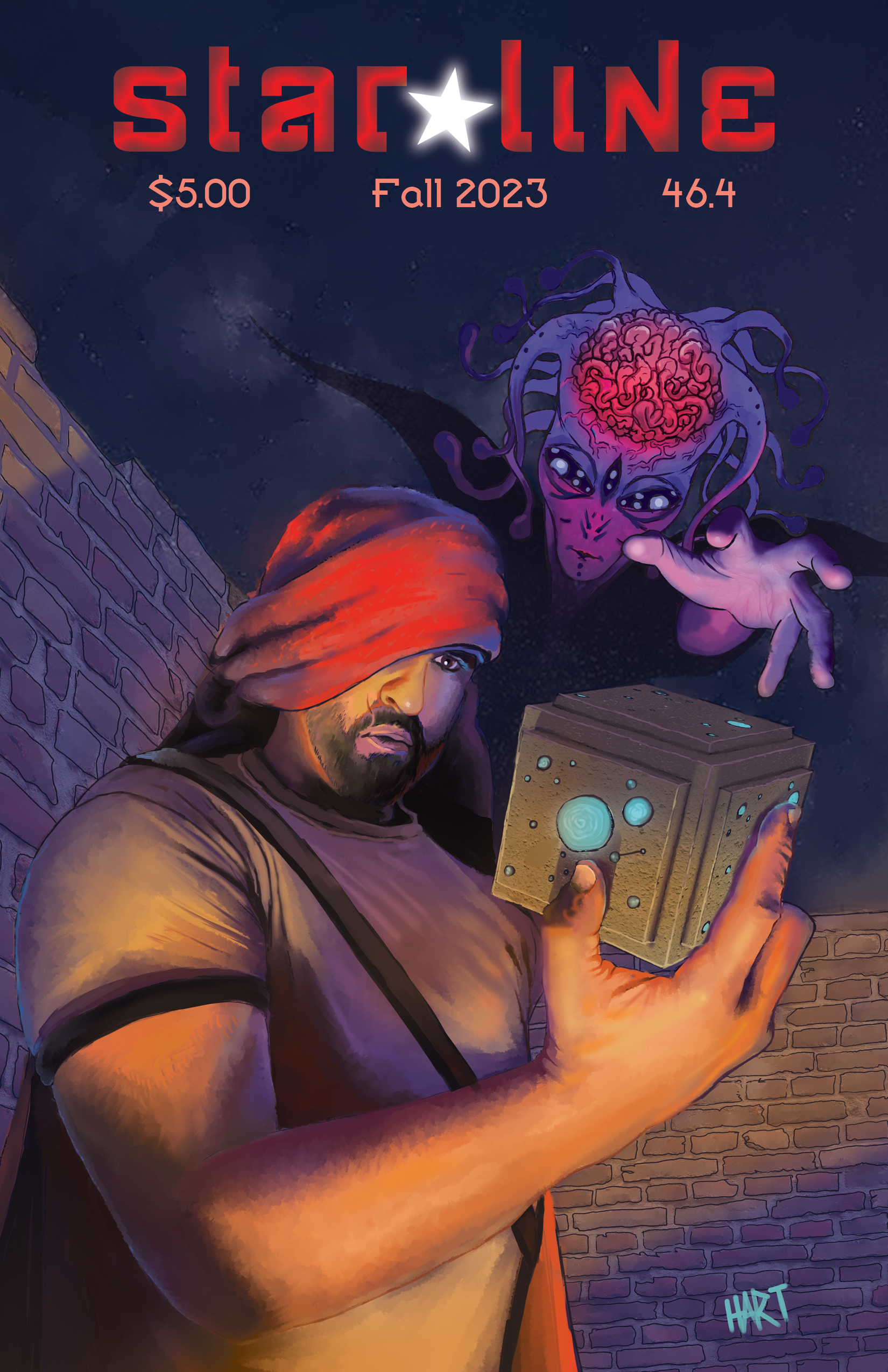Journey through the realms of speculative fiction with Star*line’s latest winter issue.
My adventures in speculative poetry all started with a blog brainstorming session.
The idea, among posts about sky-watching and book reviews, was to write a brief post on poetry in science fiction. To be sure, I’d encountered brief snippets of poetry over decades of reading and writing science fiction before, such as chapter intros in Frank Herbert’s Dune novels or May Swenson’s classic Southbound on the Freeway that I had read in elementary school, about an alien visitor that looks at congested U.S. highways, and concludes that the automobile is the dominant life form on Earth.

But how much science fiction poetry, I thought to myself, is out there… really? Is there enough to justify dedicating and entire blog post to?
Turns out, there’s lots, and there’s even a flagship magazine called Star*line that leads the pack, with something I learned is more properly termed of as ‘speculative poetry.’ Star*line goes beyond the ‘rockets and ray guns’ of science fiction, and brings the intersection of fantasy and horror genres into the fold.
Why read (and write) speculative poetry? To me, poetry is an idea or story concept, distilled down to its single sharp point. I know lots of writers (myself included) that like to use quick poetry prompts not only to test an idea, but to kick start a deep work writing session into gear.
I suspect a good majority of readers who search out poetry to read are also writers, though it need not really be this way. For example, while some folks have never read a book since it was required in high school, nearly everyone watches movies and television of some sort. Reading Star*line can help to fix that, or at least, expand your speculative vistas. Styles and types you might encounter include Scifiku (science fiction haiku), nonet nine line verse poetry, and more.
Published since 1978 by the Science Fiction & Fantasy Poetry Association (SFPA), Star*line is a product of love, crafted by those who know and love speculative fiction.
International submissions to Star*line are welcome as well, and offer an insight into the global perspective on poetry and the human condition.
Some far out speculative artwork also makes its way into Star*Line in each seasonal issue, giving readers a surreal peek into worlds never seen. Each issue of Star*line runs the gamut not only in genre and style of poetry, but length, from short three line haikus to full-length expositions.
Top examples from the current issue include a short ode to cosmic jingoism under a galactic imperial banner by Royal Baysinger:
a soldier bleeding out
under twin suns
neither of them his
A nonet ode to the re-branded modern UAP (neé UFO) craze by Wendy Van Camp:
how many ways I communicate
without you understanding me
instant acceleration
radiating wheat fields
buzzing power plants
yet you refuse
to believe
I am
here
...And a hard taste of reality via fantasy, in Marsheila Rockwell’s Some Things Never Change:
Once upon a time
Fairy tales always start that way
As if curses were a thing of the past
But envy, greed, and cruelty are everlasting
As are the souls taken in exchange for my services
Business has never been better
And that’s just a brief sampling of the dozens of amazing poems within, amid the ‘spider invasions, alien invasions, and curated curses’ within the latest issue.
Why read poetry? We’ve all seen Goethe’s admonition, perhaps on a coffee mug or in a classroom frame to “Every day… read a good poem, see a fine picture,” maybe without giving it much thought. Certainly, we’re flooded with words and images from every possible direction vying for our attention these days, without much thought as to their origin, the process of creating the finished product. Poetry often gets left out.
My very subjective view is that writers have an innate hunger to reveal the unseen, and that penning a tale is often the only way to experience something we never can in person. We’ll (probably) never travel in time to witness the fall of Rome firsthand, or see where future takes humanity, or stand on the dunes of Pluto or the ethane lake shores of Titan… but by writing about them we can, in a vicarious sort of way.
Likewise, (being that Halloween is just past), we know in the daylight that ghouls and goblins don’t exist… but what does their persistence in modern cultural mythos, recycled in movies and television say about their place in the human psyche?
All great thoughts to ponder, as you pick up the most recent issue of Star*Line and journey to the outer and inner realms of speculative fiction.
by Dave Dickinson
Author Page: David Dickinson
Youtube: http://www.youtube.com/astroguyz
Instagram: http://www.instagram.com/astro_guyz/
Mastodon: @AstroDave@astrodon.social

